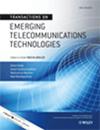Jing Yang, Jianping An, Xiangming Li, L. Yuan
{"title":"无速率码辅助相干m - ry PSK系统在存在接收机缺陷和信号衰落的情况下","authors":"Jing Yang, Jianping An, Xiangming Li, L. Yuan","doi":"10.1002/ett.1487","DOIUrl":null,"url":null,"abstract":"In this paper, we study the bit error rate (BER) and the symbol error probability (SEP) performance for a rateless coded M-ary phase-shift keying (MPSK) system in a situation where stochastic phase error, quadrature error and in-phase–quadrature (I–Q) gain mismatch take place all concurrently over a Rician fading channel. Similar scenario has been considered before by Djordjevic et al. for quasi-cyclic low-density parity-check (QC-LDPC) codes, but the effect of I–Q gain mismatch is not correctly modeled, because the Gaussian noise components in I and Q paths are assumed to have the same variance. By taking two different Gaussian noise variances into consideration, precise expressions are derived for the SEP of a coherent MPSK system under the aforementioned condition (with the stochastic phase error depicted by Tikhonov distribution), thus providing a baseline to evaluate the merits of the proposed rateless coded system and that of QC-LDPC codes. The validity of the rateless coded system is substantiated by simulation results. It is observed that rateless codes outperform QC-LDPC codes even the I–Q gain mismatch is modeled in the same way as Djordjevic's work when the target BER is lower than 10−2. Copyright © 2011 John Wiley & Sons, Ltd.","PeriodicalId":50473,"journal":{"name":"European Transactions on Telecommunications","volume":"70 1","pages":"367-374"},"PeriodicalIF":0.0000,"publicationDate":"2011-11-01","publicationTypes":"Journal Article","fieldsOfStudy":null,"isOpenAccess":false,"openAccessPdf":"","citationCount":"4","resultStr":"{\"title\":\"Rateless codes aided coherent M-ary PSK systems in the presence of receiver imperfections and Rician fading\",\"authors\":\"Jing Yang, Jianping An, Xiangming Li, L. Yuan\",\"doi\":\"10.1002/ett.1487\",\"DOIUrl\":null,\"url\":null,\"abstract\":\"In this paper, we study the bit error rate (BER) and the symbol error probability (SEP) performance for a rateless coded M-ary phase-shift keying (MPSK) system in a situation where stochastic phase error, quadrature error and in-phase–quadrature (I–Q) gain mismatch take place all concurrently over a Rician fading channel. Similar scenario has been considered before by Djordjevic et al. for quasi-cyclic low-density parity-check (QC-LDPC) codes, but the effect of I–Q gain mismatch is not correctly modeled, because the Gaussian noise components in I and Q paths are assumed to have the same variance. By taking two different Gaussian noise variances into consideration, precise expressions are derived for the SEP of a coherent MPSK system under the aforementioned condition (with the stochastic phase error depicted by Tikhonov distribution), thus providing a baseline to evaluate the merits of the proposed rateless coded system and that of QC-LDPC codes. The validity of the rateless coded system is substantiated by simulation results. It is observed that rateless codes outperform QC-LDPC codes even the I–Q gain mismatch is modeled in the same way as Djordjevic's work when the target BER is lower than 10−2. Copyright © 2011 John Wiley & Sons, Ltd.\",\"PeriodicalId\":50473,\"journal\":{\"name\":\"European Transactions on Telecommunications\",\"volume\":\"70 1\",\"pages\":\"367-374\"},\"PeriodicalIF\":0.0000,\"publicationDate\":\"2011-11-01\",\"publicationTypes\":\"Journal Article\",\"fieldsOfStudy\":null,\"isOpenAccess\":false,\"openAccessPdf\":\"\",\"citationCount\":\"4\",\"resultStr\":null,\"platform\":\"Semanticscholar\",\"paperid\":null,\"PeriodicalName\":\"European Transactions on Telecommunications\",\"FirstCategoryId\":\"1085\",\"ListUrlMain\":\"https://doi.org/10.1002/ett.1487\",\"RegionNum\":0,\"RegionCategory\":null,\"ArticlePicture\":[],\"TitleCN\":null,\"AbstractTextCN\":null,\"PMCID\":null,\"EPubDate\":\"\",\"PubModel\":\"\",\"JCR\":\"\",\"JCRName\":\"\",\"Score\":null,\"Total\":0}","platform":"Semanticscholar","paperid":null,"PeriodicalName":"European Transactions on Telecommunications","FirstCategoryId":"1085","ListUrlMain":"https://doi.org/10.1002/ett.1487","RegionNum":0,"RegionCategory":null,"ArticlePicture":[],"TitleCN":null,"AbstractTextCN":null,"PMCID":null,"EPubDate":"","PubModel":"","JCR":"","JCRName":"","Score":null,"Total":0}
引用次数: 4
Rateless codes aided coherent M-ary PSK systems in the presence of receiver imperfections and Rician fading
In this paper, we study the bit error rate (BER) and the symbol error probability (SEP) performance for a rateless coded M-ary phase-shift keying (MPSK) system in a situation where stochastic phase error, quadrature error and in-phase–quadrature (I–Q) gain mismatch take place all concurrently over a Rician fading channel. Similar scenario has been considered before by Djordjevic et al. for quasi-cyclic low-density parity-check (QC-LDPC) codes, but the effect of I–Q gain mismatch is not correctly modeled, because the Gaussian noise components in I and Q paths are assumed to have the same variance. By taking two different Gaussian noise variances into consideration, precise expressions are derived for the SEP of a coherent MPSK system under the aforementioned condition (with the stochastic phase error depicted by Tikhonov distribution), thus providing a baseline to evaluate the merits of the proposed rateless coded system and that of QC-LDPC codes. The validity of the rateless coded system is substantiated by simulation results. It is observed that rateless codes outperform QC-LDPC codes even the I–Q gain mismatch is modeled in the same way as Djordjevic's work when the target BER is lower than 10−2. Copyright © 2011 John Wiley & Sons, Ltd.

 求助内容:
求助内容: 应助结果提醒方式:
应助结果提醒方式:


